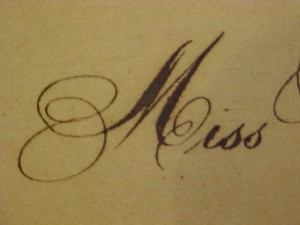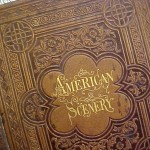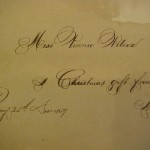You’d be surprised at what might be found in books turned in to the shop. Wedding pictures. Postcards. Bookstore receipts (lots of those, mostly from high-priced sellers). A valid US passport, which – fortunately – belonged to a woman still shopping when it was discovered. Bookmarks from long-shuttered bookstores.
Post-it note place keepers. Candy wrappers. A hastily-written last will and testament. That one gave me pause, I have to say.
Still – not a single piece of currency. Not even a single one-dollar bill.
Yesterday, I came across an angrily-written, unsigned, and undated letter to Etta. My detective skills tell me that the name Etta took a dive in popularity in the 1930s, after being a top-ten candidate back in the 1880s.
The letter appears to have been written with a ballpoint pen, which first went on sale in the US in 1945.
My guess is, the letter-writer was perhaps a grandmother or aunt to Barbara, the subject of the terse writing. Apparently, Barbara had gone back to her boyfriend after discovering she was “expecting a baby,” and in the writer’s opinion the beau was “not fit to be a father because of being a grasshopper… no steady job.”
She still cared enough about the young woman to forward a $25 check to the letter’s recipient, to “take Barbara to town to buy her a new pair of shoes and a nice dress for her birthday.”
That’s about as close to finding money as I’ve come – finding a letter about a check.
More commonly found are penned inscriptions, written inside the front cover or on the first free endpaper. Sometimes, they seem to tell their own stories in the few words included or the manner in which they are written.
I was particularly impressed with Rodney’s elaborate penmanship in his inscription inside a leather-bound volume which was a Christmas gift to Miss Minnie Wilcox. You can click on any image to see it more closely. If you click the lower-right image, you can see that Rodney penned the inscription in 1849… one-hundred-sixty-four years ago.
Someone told me recently that penmanship is no longer taught in school. From the example in the image, it is clear we don’t have sufficient time to devote to such beautiful and elaborate causes as book-signing. There was once a day in which there was time enough.
I was exposed to the art of cursive for all the good it has done me. I can produce a tidy example of script given enough time, but when I’m in a hurry – my scribbling winds up as printed letters.
Go figure.



